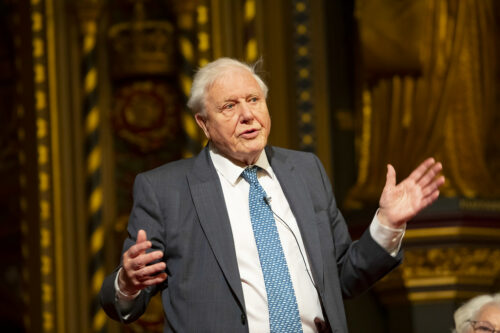Image Courtesy of House of Lords.
Lying in my bed on a Saturday morning, I hesitantly opened my laptop to begin watching David Attenborough’s latest documentary, Breaking Boundaries: The Science of Our Planet. I say “hesitantly” because, while I am a huge proponent of sustainable living and learning about how climate change affects us, I’m honestly not a big documentary guy. While I have, no doubt, seen my fair share of An Inconvenient Truth-esque films, sooner or later, they all begin to meld into one big, urgent, overwhelming, ominous mess. However, after watching this riveting documentary, I can say with full confidence that if you are someone who wants to learn more about the ways in which humans have, quite literally, broken the boundaries of Earth’s climate, biospheres, oceans, and atmosphere, then this is the perfect Netflix quick-fix for you.
Taking a much more climate-forward approach to education than his past documentaries, David Attenborough starts off by introducing Swedish climate scientist Johan Rockström. Rockström and his colleagues gained fame within the scientific community recently when they hypothesized that there are nine boundaries humans need to respect in order to keep Earth sustainable for human life. While we currently live within the safe zones for five of the boundaries (freshwater use, ocean acidification, aerosol pollution, ozone layer depletion, and novel pollutants like nuclear waste), we have already surpassed four of the boundaries: climate change, land use, biodiversity integrity, and biogeochemical flows of nitrogen and phosphorus.
The effects of crossing these boundaries can be seen most significantly by the melting of the ice poles. However, scientists in the documentary also point out that an increase in drought, wildfires, flooding, and even the onset of the COVID-19 pandemic can all be tied back to our unsustainable living habits.
Their perspectives show us that this planetary crisis is a metaphorical asteroid coming to Earth. We are reaching a point where ignorance of this issue is simply unacceptable. Healthcare services have become overwhelmed, entire ecosystems face collapse, and novel zoonotic diseases have been transmitted to humans, all because of the climate disaster. If humans do not act with responsibility and purpose, our planet will soon be uninhabitable.
After hearing about this incredibly overwhelming climate crisis, where do you begin to tackle this problem on an individual level?
Watching this documentary is definitely a start. You can also join a club on campus. If you’re interested in assuming a leadership role, think about applying to be a Residential College Sustainability Liaison. When eating in the dining halls, maybe swap out your cheeseburger for tofu tenders every so often, since transitioning to a more plant-based diet is one of the single most important ways you can reduce your carbon footprint. When possible, buy your clothes second-hand, and walk or bike around. Continue to educate yourself about the problems facing our planet and vote for environmentally conscious politicians.
With these actions in mind, we must now begin to act with a unified purpose, in search of—as David Attenborough puts it—the perfect home.

